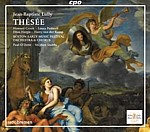This allegorical poem to Louis XIV–he is praised as the “greatest gift of the heavens” by the opera’s close–should not by judged by its amazing brown-nosing; that was expected at court in 1675 when Lully composed this gorgeous work. Even so, most of these opéra-ballets began with a prologue featuring gods in their own realms: here, Venus, Mars, Bacchus, etc., are actually in the Gardens at Versailles. Scenes take place in an “enchanted island” and a “frightful desert”; in the third act, Medea conjures up “the inhabitants of hell” to scare her rival for the King’s hand. There are acres of flavorful music in the almost three-hour spectacle, and it is easy to tell why it was frequently performed in France for 104 years after it was composed.
This performance, by the Boston Early Music Festival Orchestra and Chorus under both Paul O’Dette and Stephen Stubbs, is superb, filled with precisely the right frills and pomp one would hope for. Lully can be somewhat inhuman–unlike Rameau–but here the music sparkles, with recitatives, decorated though they tend to be, delivered as close to conversationally as the music allows. Nearly half the music is purely instrumental. A battle scene is accompanied by trumpets and drums and there are dozens of brief dances, exqusitely scored–those musettes buzz in the head! And kudos to the conductors for making them an integral part of the action rather than seeming as if they are interrupting the story, as is all too often the case. Of course, Thésée is a museum piece, but here it is one that’s led, played, and sung with such verve that it instantly brings to life the period in which it was born.
The excellent cast has tenor Howard Crook in the title role, singing with heroism, sweet tone, and grace. Bass Harry van der Kamp’s portrayal of the King, Ægée, is authoritative; his beloved Æglé, who loves Thésée, is sung smoothly and with feeling and pure tone by soprano Ellen Hargis, and Laura Pudwell, as the evil Medée, who still loves Ægée, is forceful, but a darker tone might have been welcome. As the “secondary” couple, Suzie LeBlanc as Cleone and Olivier Laguerre as Arcas are excellent. There’s not a weak link in the ensemble, and the chorus, whether Cupids, Warriors, or the Damned, is superb. The 42-piece period-instrument orchestra plays with impressive virtuosity, with the winds and the Baroque guitar and theorbo very prominent. This is a beauty of a set: if French Baroque opera fits into your listening habits, this will ravish the ear. [8/16/2007]
































